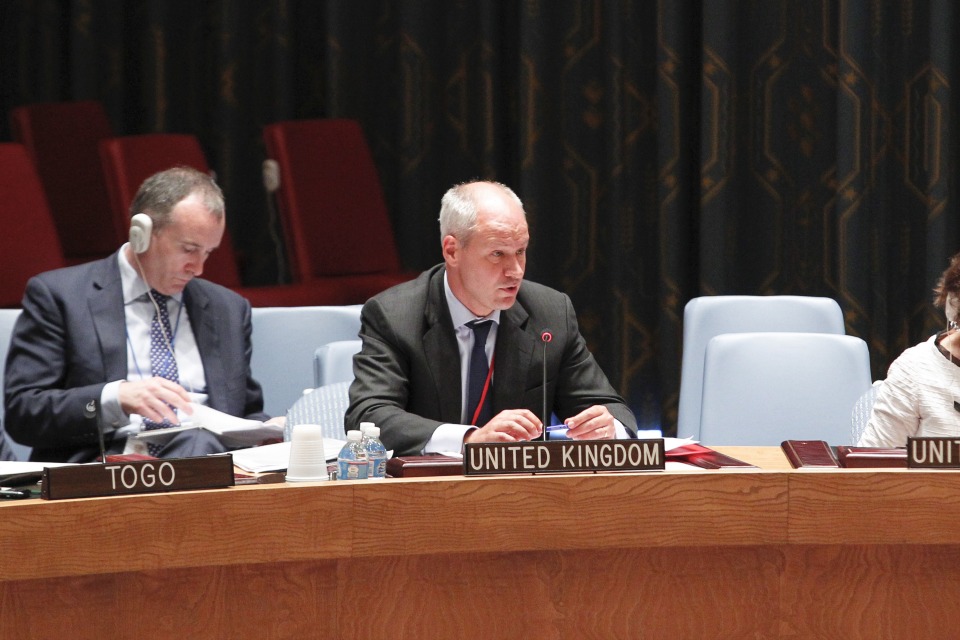'We cannot afford to file away counter-terrorism until the next review in 2016'
Statement by Ambassador Peter Wilson, Deputy Permanent Representative of the UK Mission to the UN, to the General Assembly on the UN Global CT Strategy Review

Madame President, I congratulate you on the successful completion of the Fourth Review of the United Nations Global Counter-Terrorism Strategy.
We thank the Mission of Turkey for the able facilitation of the review and we express our profound solidarity with Turkey after the kidnapping of their nationals by ISIL. This is an act which is an act of despicable cowardice which has been roundly condemned by the world including by the Security Council unanimously in its statement of yesterday.
As the Secretary-General noted in his report, the international community’s response to terrorism must remain anchored in preventative measures, respect for human rights, and respect for the rule of law. Political instability, conflict and economic strife can create conditions that ferment terrorist tendencies. That is why countering violent extremism and pursuing development opportunities are essential in tackling the scourge of terrorism.
The international terrorist threat is evolving. Since the last review of the Strategy in 2012, that threat has both become more fragmented and more diverse. The Strategy is an important element in the international response to terrorism because it demonstrates the international community’s fundamental principles and clear direction.
This year’s review focuses upon two worrying trends:
First, the payment of ransoms to terrorist groups who carry out kidnapping to finance their operations has become a predominant funding activity for many terrorist groups. We now have a vicious cycle where ransom payments strengthen terrorist groups and incentivise future incidents of kidnapping. This cycle must to be broken. The recent abduction of the schools girls in Nigeria by Boko Haram is a tragic demonstration of the horror that powerful, well-funded terrorist groups can inflict.
Second, an unprecedented number of individuals are travelling to conflict zones, such as Syria, to fight with terrorist groups. These individuals may pose a threat to their home countries when they return. They also pose an international threat as they are prone to commit random terrorist attacks across the globe. The recent attack at the Brussels Jewish Museum is a manifestation of this trend. In the face of this threat, our shared priority should be to dissuade individuals from travelling to areas of conflict and instead give them safe and effective channels for them to make positive humanitarian contributions to people directly affected by conflict. The Syrian people have been clear that they want a political solution to the conflict, and humanitarian assistance, not foreign fighters. But foreign fighters continue to head for Syria. We cannot rely on prevention alone. The international community must be ready to disrupt the flow of foreign fighters by enhancing cooperation in areas such as information sharing and border management. Disruption also needs to be backed up by an appropriate criminal justice response.
The United Nations system itself and its instruments have an important role to play in tackling terrorist threats. In order to fulfil that role, the United Nations’ entities must improve their coordination and sharing of information. There are excellent resources to draw upon: the Counter Terrorism Executive Directorate is a centre of analytical expertise and the Counter Terrorism Implementation Task Force is a centre of capacity building expertise. If these two centres agree common priorities and action plans, the United Nations system has the potential to deliver real impact and support to the regions and countries most vulnerable to the threat of terrorism. In particular, the United Nations Counter Terrorism Centre has the potential to play a significant role in the implementation of capacity building programmes.
The United Nations entities must also continue to work with partners in the global struggle against terrorism. The Global Counter Terrorism Forum is a key partner that has made significant contributions to counter violent extremism and strengthening criminal justice institutions, and continues to work closely with the United Nations counter terrorism bodies. The work of GCTF, and other partners, is important to multiply the efforts of the United Nations and mobilize resources for their implementation.
Madame President, we cannot afford to file away counter-terrorism until the next review in 2016. We must remain agile, responsive and collaborative in the face of the threat. At that point, ten years after it was agreed, we should evaluate the contribution of the United Nations Strategy and use that opportunity to plan for the future.
I thank you.